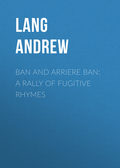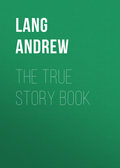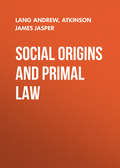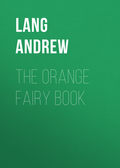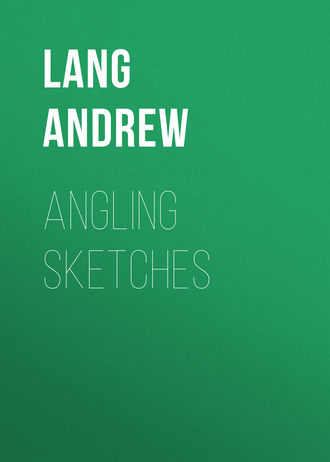
Lang Andrew
Angling Sketches
It is probable that the young child of Israel, if he had been attempting any mischief, did not succeed in it. Had there been any trouble, it is likely enough that he would have involved Allen in the grief. Then Allen would have been in a, perhaps, unprecedented position. He could have established an alibi, as far as the Jew’s affairs went, by proving that he had been at Blocksby’s at the hour when the boy would truthfully have sworn that he had let him into Isaacs’ chambers. And, as far as the charge against him at Blocksby’s went, the evidence of the young Jew would have gone to prove that he was at Isaacs’, where he had no business to be, when we saw him at Blocksby’s. But, unhappily, each alibi would have been almost equally compromising. The difficulty never arose, but the reason why Allen refused to give any account of what he had been doing, and where he had been, at four o’clock on that Saturday afternoon – a refusal that told so heavily against him – is now sufficiently clear. His statement would, we may believe, never have been corroborated by the youthful Hebrew, who certainly had his own excellent reasons for silence, and who probably had carefully established an alibi of his own elsewhere.
The true account of Allen’s appearance, or apparition, at Blocksby’s, when I and Tarras, Wentworth and the attendant recognised him, and Miss Breton did not, is thus part of the History of the Unexplained. Allen might have appealed to precedents in the annals of the Psychical Society, where they exist in scores, and are technically styled “collective hallucinations.” But neither a jury, nor a judge, perhaps, would accept the testimony of experts in Psychical Research if offered in a criminal trial, nor acquit a wraith.
Possibly this scepticism has never yet injured the cause of an innocent man. Yet I know, in my own personal experience, and have heard from others, from men of age, sagacity, and acquaintance with the greatest affairs, instances in which people have been distinctly seen by sane, healthy, and honourable witnesses, in places and circumstances where it was (as we say) “physically impossible” that they should have been, and where they certainly were not themselves aware of having been. That is why human testimony seems to me to establish no more, in certain circumstances, than a highly probable working hypothesis – a hypothesis on which, of course, we are bound to act.
There is little more to tell. By dint of careful nursing, poor Allen was enabled to travel; he reached Mentone, and there the mistral ended him. He was a lonely man, with no kinsfolk; his character was cleared among the people who knew him best; the others have forgotten him. Nobody can be injured by this explanation of his silence when called on to prove his innocence, and of his unusually successful vanishing from a society which had never tried very hard to discover him in his retreat. He has lived and suffered and died, and left behind him little but an incident in the History of the Unexplained.
THE COMPLETE BUNGLER
SCENE I. – HAMPSHIRE
PISCATOR ANGLUS. PISCATOR SCOTUS
Scotus. – Well, now let’s go to your sport of angling. Where, Master, is your river?
Anglus. – Marry, ’tis here; mark you, this is the famous Test.
Scotus. – What, Master, this dry ditch? There be scarce three inches of water in it.
Anglus. – Patience, Scholar, the water is in the meadows, or Master Oakley, the miller, is holding it up. Nay, let us wait here some hour or so till the water is turned on. Or perchance, Scholar, for the matter of five shillings, Master Oakley will even raise his hatches, an you have a crown about you.
Scotus. – I like not to part with my substance, but, as needs must, here, Master, is the coin.
[Exit ANGLUS to the Mill. He returns.
Anglus. – Now, Scholar, said I not so? The water is turned on again, and, lo you, at the tail of yonder stream, a fair trout is rising. You shall see a touch of our craft.
[ANGLUS crawls on his belly into a tuft of nettles, where he kneels and flicks his fly for about ten minutes.
Anglus. – Alas, he has ceased rising, and I am grievously entangled in these nettles. Come, Scholar, but warily, lest ye fright my fish, and now, disentangle my hook.
Scotus. – Here is your hook, but, marry, my fingers tingle shrewdly with the nettles; also I marked the fish hasting up stream.
Anglus. – Nay, come, we shall even look for another.
Scotus. – Oh, Master, what is this? That which but now was dry ditch is presently salad bowl! Mark you how the green vegetables cover the waters! We shall have no sport.
Anglus. – Patience, Scholar; ’tis but Master Hedgely’s men, cutting the weeds above. We may rest us some hour or two, till they go by. Or, perchance, for a matter of five shillings —
Scotus. – Nay, Master, this English angling is over costly. The rent of your ditch is high, the expenses of travel are burdensome. In crawling through your nettles and thistles I have scratched my face, and torn my raiment, and I will not pay the labourer to cease labouring in his industry.
Anglus. – Why then, pazienza, Scholar, or listen while I sing that sweet ditty of country contentment and an angler’s life, writ by worthy Master Hackle long ago.
SONG
The Angler hath a jolly life
Who by the rail runs down,
And leaves his business and his wife,
And all the din of town.
The wind down stream is blowing straight,
And nowhere cast can he;
Then lo, he doth but sit and wait
In kindly company.
Or else men turn the water off,
Or folk be cutting weed,
While he doth at misfortune scoff,
From every trouble freed.
Or else he waiteth for a rise,
And ne’er a rise may see;
For why, there are not any flies
To bear him company.
Or, if he mark a rising trout,
He straightway is caught up,
And then he takes his flasket out,
And drinks a rousing cup.
Or if a trout he chance to hook,
Weeded and broke is he,
And then be finds a goodly book
Instructive company.
What think you of my song, Scholar? ’Tis choicely musical. What, he is gone! A pest on those Northerners; they have no manners. Now, methinks I do remember a trout called George, a heavy fellow that lies ever under the arch of yonder bridge, where there is shelter from the wind. Ho for George!
[Exit singing.
SCENE II. – A BRIDGE
Enter ANGLUS
Anglus. – Now to creep like your Indian of Virginia on the prey, and angle for George. I’faith, he is a lusty trout; many a good Wickham have I lost in George.
[He ensconces himself in the middle of a thorn bush.
Anglus. – There he is, I mark his big back fin. Now speed me, St. Peter, patron of all honest anglers! But first to dry my fly!
[He flicks his fly for ten minutes. Enter BOY on Bridge. ANGLUS makes his cast, too short. BOY heaves a great stone from the Bridge. Exit GEORGE. Exit BOY.
Anglus. – Oh, Mass! verily the angler had need of patience! Yonder boy hath spoiled my sport, and were it not that swearing frights the fish, I could find it in my heart to say an oath or twain. But, ha, here come the swallows, hawking low on the stream. Now, were but my Scholar here, I could impart to him much honest lore concerning the swallow, and other birds. But where she hawks, there fly must be, and fish will rise, and, look you, I do mark the trout feeding in yonder ford below the plank bridge.
[ANGLUS steals off, and gingerly takes up his position.
Anglus. – Marry, that is a good trout under the burdock!
[He is caught up in the burdock, and breaks his tackle.
Anglus. – Now to knot a fresh cast. Marry, but they are feeding gaily! How kindly is the angler’s life; he harmeth no fish that swims, yet the Spectator deemeth ours a cruel sport. Ah, good Master Townsend and learned Master Hutton, little ye wot of our country contents. So, I am ready again, and this Whitchurch dun will beguile yonder fish, I doubt not. Marry, how thick the flies come, and how the fish do revel in this merciful provender that Heaven sendeth! Verily I know not at which of these great fellows to make my essay.
[Enter twenty-four callow young ducks, swimming up stream. The ducks chevy the flies, taking them out of the very mouths of the trout.
Anglus. – Oh, mercy. I have hooked a young duck! Where is my landing-net? Nay, I have left it under yonder elm!
[He struggles with the young duck. By the conclusion of the fray the Rise is over.
Anglus. – I have saved my fly, but lo, the trout have ceased to feed, and will rise no more till after sunset. Well, “a merry heart goes all the way!” And lo, here comes my Scholar. Ho, runaway, how have you sped?
Scotus. – Not ill. Here be my spoils, great ones; but how faint-hearted are your southern trout!
Anglus. – That fat fellow is a good three pounds by the scales. But, Scholar, with what fly caught ye these, and where?
Scotus. – Marry, Master, in a Mill-tail, where the water lagged not, but ran free as it doth in bonny Scotland; nor with no fly did I grip him, but with an artificial penk, or minnow. It was made by a handsome woman that had a fine hand, and wrought for Master Brown, of Aberdeen. The mould, or body of the minnow, is of parchment, methinks, and he hath fins of copper, all so curiously dissembled that it will beguile any sharp-sighted trout in a swift stream. Men call it a Phantom, Master; wilt thou not try my Phantom?
Anglus. – Begone, sirrah. I took thee for an angler, and thou art but a poaching knave!
Scotus. – Knave thyself! I will break thy head!
Anglus. – Softly, Scholar. Here comes good Master Hedgely, who will see fair play. Now lie there, my coat, and have at you!
[They fight, SCOTUS is knocked down.
Anglus. – Half-minute time! Time is up! Master Hedgely, in my dry fly box thou wilt find a little sponge for moistening of my casting lines. Wilt thou, of thy courtesy, throw it up for my Scholar? And now, Scholar, trust me, thy guard is too low. I hope thou bearest no malice.
Scotus. – None, Master. But, lo! I am an hungered; wilt thou taste my cates? Here I have bread slices and marmalade of Dundee. This fishing is marvellous hungry work.
Anglus. – Gladly will I fall to, but first say me a grace – Benedictus benedicat! Where is thine usquebaugh? Marry, ’tis the right Talisker!
Scotus. – And now, Master, wherefore wert thou wroth with me? Came we not forth to catch fish?
Anglus. – Nay, marry, Scholar, by no means to catch fish, but to fish with the dry fly. Now this, humanly speaking, is impossible; natheless it is rare sport. But for your fish, as they were ill come by, let us even give them to good Master Hedgely here, and so be merry till the sedges come on in the late twilight. And, trust me, this is the rarest fishing, and the peacefulest; only see that thou fish not with the wet fly, for that is Anathema. So shall we have light consciences.
Scotus. – And light baskets!
Anglus. – Ay, it may be so.



